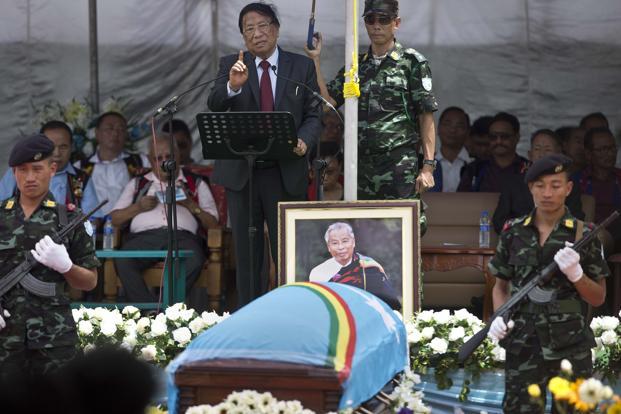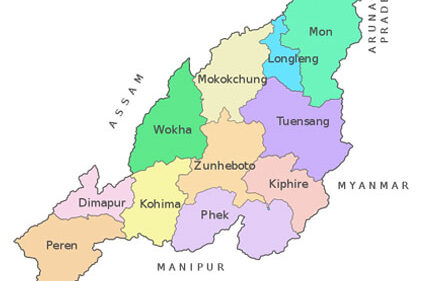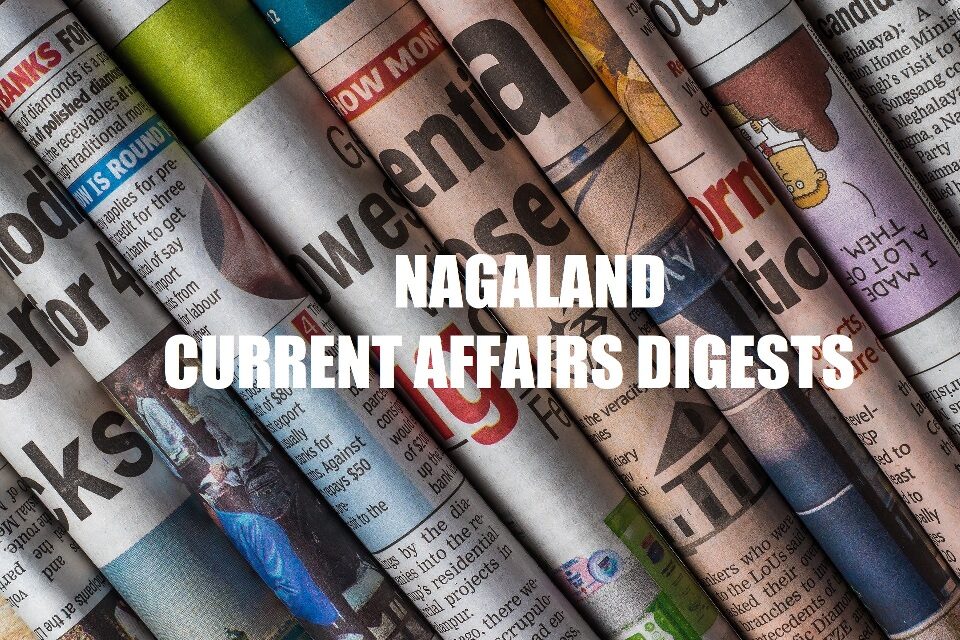Important Events in Naga History (2000 onwards)
2002: President of India, Dr. A.P.J. Abdul Kalam visited Nagaland in October 2002.
2003: A.B. Vajpayee visited Nagaland (28 Oct. 2003).
2003: 10th General Elections in Nagaland – Neiphiu Rio comes to power.
- The Democratic Alliance of Nagaland(DAN) comprising of Naga People’s Front, the Bharatiya Janata Party, Janata Dal (United) and the Samata Party won a majority of seats and Neiphiu Rio was appointed as the Chief Minister of Nagaland.
2003: BSNL launched first mobile service in Nagaland.
2003: Kiphire , Longleng and Peren given district status on 15th August 2003.
- Notified in 2004.
2004: Task Force for Music constituted by the Govt. of Nagaland.
2004: Kiphire (22 Jan), Longleng (26 Jan) and Peren (11Feb) – became full fledged new districts in Nagaland.
2004: Govt of Nagaland declared 2004 as the ‘Year of Scientific Awareness’.
2005: Mithun adopted as State animal of Nagaland.
2005: VAT implemented for the first time in Nagaland.
2005: Govt of Nagaland declared 2005 as the ‘Year of Youth empowerment’.
2005: Prepaid mobile service in the State inaugurated by Governor on 24th February 2005.
2006: Govt of Nagaland declared 2006 as the ‘Year of Farmers’.
2007, November 23: Formation of National Socialist Youth empowerment Council of Nagaland-Unification (NSCN-U)
- National Socialist Council of Nagaland-Unification (NSCN-U) was formed on November 23, 2007 with an inter-factional ‘truce agreement’ signed between few cadres and leaders of the National Socialist Council of Nagaland-Isak-Muivah (NSCN-IM) and the rival National Socialist Council of Nagaland–Khaplang (NSCN-K) at Hovishe under Niuland sub-division in Dimapur district.
2008: The Fourth President’s Rule imposed in Nagaland
- 03-Jan-2008 to 12-Mar-2008 (69 days ) till the formation of the DAN Government after the 11th general elections in Nagaland.
2008: 11th General Elections in Nagaland
- The Nagaland Peoples Front won the most seats and Neiphiu Rio was appointed as the Chief Minister of Nagaland for the second time.
2008: Govt of Nagaland declared 2008 as the ‘Year of Capacity building’.
2008, February: Forum for Naga Reconciliation (FNR) formed
- The Forum for Naga Reconciliation (FNR) was formed in principle on February 24, 2008.
- It was one of the outcomes of the Naga Peace Convention organized by the Naga Shisha Hoho in Dimapur.
- It was christened on March 25, 2008 at Kohima with the support of 39 Naga frontal organizations, the Nagaland Baptist Church Council (NBCC), and the Council of Naga Baptist Churches (CNBC).
2009, June 13: ‘Covenant of Reconciliation’ (CoR)
- ‘Covenant of Reconciliation’ (CoR) signed by the top leaders of NSCN-K, NSCN-IM and the Federal Government of Nagaland / Naga National Council (FGN/NNC) on June 13, 2009, after a Naga Reconciliation meet was held in Chiang Mai in Thailand from June 1 to June 8, 2009.
- One of the benefits of the CoR: it brought down decades of factional violence and killings.
2009: Global Open University established in Wokha.
2010: Govt of Nagaland declared 2008 as the ‘Year of Entrepreneurs’.
2011: President of India Pratibha Patil visited the state on March 9th to 10th.
2011: Naga People’s Front, a political party from Nagaland launched NPF Manipur unit on 28th May 2011.
2011, August 26: The ‘Naga Concordant’
- The Naga Concordant was signed on August 16, 2011.
- The objective is to resolve to work towards the formation of one Naga National Government.
- It is a joint declaration signed by all the six leaders—Isak Chishi Swu and Thuingaleng Muivah of NSCN-IM; ‘General’ Khole Konyak and N. Kitovi Zhimomi of NSCN-Khole-Kitovi; and ‘Brigadier’ S. Singnya and Zhopra Vero of NNC after they resolved “in principle” on 26 August 2011, to work towards the formation of one ‘Naga National Government’.
- The signatories stated: “Having Reconciled on the basis of the Historical and Political Rights, the top Naga leaders have agreed that Nagas are ONE. Therefore, in pursuance of this agreement, the following signatories have resolved in principle to work towards the formation of one Naga National Government. To expedite this process of eventually forming the Naga National Government, a High Level Commission was formed with the Forum for Naga Reconciliation as facilitators.”
2011, June 7: NSCK (K) split – NSCN (Khole-Kitovi) or NSCN (KK) formed
- NSCN (KK), a ‘splinter group’ of NSCN-K, was formed under the leadership of Khole Konyak and Kitovi Zhimomi after internal conflicts with S.S.Khaplang, leader of NSCN (K).
2011: Second ENPO rally for Statehood demand for ‘Frontier Nagaland’ held on 20 September 2011.
2012, February 12: NSCN(K) signed ceasefire with Myanmar Government.
2012: Nagaland Cricket Stadium and Nagaland Cricket Academy was inaugurated by the Chief Minister of Nagaland, Shri. Neiphiu Rio,at Sovima, Dimapur on 14th April 2012.
2012: Prince Andrew, Duke of York visited Nagaland on 15 May 2014.
2013: 12th General Elections (23 February 2013)
- Naga People’s Front comes to power and Neiphiu Rio was elected the Chief Minister of nagaland for the third time.
2013: Nagaland Tribal Council (NTC) formally launched on 12 October 2013.
- Naga Tribes Council (NTC) was formally launched in Kohima on October 12, 2013 as the “Tribal Apex Body of Nagaland”.
- NTC is a non-political social organization and its main object is to bring about social harmony and close understanding with all Naga tribes of Nagaland, other tribes and communities to usher a common goal of interest and destiny.
- Thepfulhouvi Solo is the first president of NTC.
2013, October 31: Massive ACAUT (Against Corruption and Unabated Taxation) rally in Dimapur resolving on ‘one government one tax’.
2013: Nagaland attains 50 years of Statehood on 1 Dec 2013.
2014 March 28 : Lenten Agreement
- Under the aegis of Forum for Naga Reconciliation (FNR), Naga Political Groups signed a pact called the “Lenten Agreement” on 28 March 2014.
- As agreed in the Naga Concordant signed on August 26, 2011, they agreed “in principle to form the Naga National Government (NNG)”.
- The signatories to the ‘Lenten Agreement’ included-
- NSCN/GPRN chairman Isak Chishi Swu and general secretary Th. Muivah;
- GPRN/NSCN president ‘Gen’ Khole Konyak and N. Kitovi Zhimomi ;
- NNC/FGN president ‘Brig’ (Rtd) S. Singnya and Zhopra Vero (NNC/FGN).
2014: Prime minister of India Narendra Modi visited Nagaland , and inaugurated the the Hornbill Festival 2014.
2015, March 27: NSCN (K) abrogated ceasefire with Government of India
- NSCN-K abrogates the 14-year old cease-fire agreement with Government of India after NSCN-K president and Chairman S.S Khaplang, along with other leaders resolved to abrogate it.
2015, April 6: Formation of NSCN (Reformation)
- NSCN(K) splits into NSCN(K) and NSCN (Reformation)
- Expelled NSCN-K leaders Y. Wangtin Naga and P. Tithak form a new outfit, ‘National Socialist Council of Nagaland (Reformation)’ or NSCN (R) and its government as ‘Government of the People’s Republic of Nagaland’ or GPRN.
- Y. Wangtin Naga and P. Tikhak were expelled by NSCN (K) president and chairman, SS Khaplang after misunderstanding arose over abrogation of ceasefire with the Government of India. The duo, wanted to continue with the ceasefire maintaining that “violence has never served a good purpose and the Naga political problem can only be resolved through peace and negotiation” while Khaplang had it abrogated because the “14 years of ceasefire between NSCN (K) and India has become a mockery and futile exercise.”
2015, April 27: NSCN-Reformation signs a cease-fire agreement for one year with the Government of India.
2015, August 3: Naga Peace Accord / Naga Framework Agreement with NSCN (IM)

- Government of India and NSCN-IM signed “Naga Peace Accord” or “Naga Framework Agreement” on 3 August 2015 at New Delhi.
- The accord is a “framework of agreement”, essentially a set of broad guidelines under which negotiations between Govt. of India and NSCN (IM) can take place, hopefully leading to an acceptable and honourable settlement of the Indo-Naga issue.
- The Naga Accord signed between the GoI and NSCN-IM was viewed as a major state in the Naga political developments scenario, NSCN-IM being a major player.
2016, June 28 : Isak Chishi Swu passed away at 87

- Isak Chishi Swu (11 November 1929 – 28 June 2016) passed away due to health conditions on 28 June 2016 at Fortis hospital in Delhi at 12.40 pm. He was 87.
- He was the Chairman of the Nationalist Socialist Council of Nagaland (NSCN).
- Isak Chishi Swu joined the NNC in 1958
- Served as the Foreign Secretary of NNC and he was later elevated to Vice President of NNC.
- Isak Chishi Swu was opposed to the signing of the Shillong Accord by the then Naga National Council (NNC) with the Government of India.
- Following a disagreement, Isak Chishi Swu along with Thuingaleng Muivah and SS Khaplang split from NNC into a new faction, called the Nationalist Socialist Council of Nagaland (NSCN). Later in 1988, NSCN split into NSCN (IM) and NSCN (K).
2016, December 13: Six (6) Naga political groups form a ‘Working Group’
- On 13 December 2016, Six Naga National Political Groups (NNPGs) agreed to come together in the interest of the Naga people and formed an interim platform by the name ‘Working Group’. The group decided on the formation of ‘working committee’, under which Naga political groups “shall chalk out the roadmap towards fulfillment of Naga political aspiration.”
- The NNPGs is comprised of six (6) Naga Nationalist groups:
(1) Government of the People’s Republic of Nagaland/National Socialist Council of Nagaland or GPRN/NSCN (Kitovi Zhimomi),
(2) Federal Government of Nagaland (FGN),
(3) Naga National Council (Parent Body),
(4) National People’s Government of Nagaland or NPGN /NNC (NA),
(5) National Socialist Council of Nagaland (Reformation) or NSCN (R) and
(6) Naga National Council/Government Democratic Republic of Nagaland or (NNC/GDRN) (NA)
2017: Violent Protests and Bandhs against 33% Women Reservation in Urban Local Bodies (ULB) elections from 13 Feb 2017.
- The agitations were organized under the aegies of Joint Coordination Committee (JCC) and Nagaland Tribe Action Committee (NTAC).
- The attempt by the State Government to implement the 33% reservation and conduct urban local body polls was met with violent protests in which two people died. In the face of mounting pressure, the then chief minister T R Zeliang resigned.
2017: Nationalist Democratic Progressive Party (NDPP) formed
- The Nationalist Democratic Progressive Party (NDPP) is a regional political party formed in 2017.
- Chingwang Konyak is the president of NDPP.
- The symbol of the party is a globe.
- In the 2018 Nagaland Legislative Assembly election, the NDPP came to power in a coalition with the BJP, with Rio as chief minister.
2017, June 9: SS Khaplang passes away at 77
- SS Khaplang ( Shangwang Shangyung Khaplang ) passes away at 77 on 9 June 2017 at Kachin State, Myanmar (Burma) due to Cardiac arrest.
2017, June 20: Khango Konyak is elected as the new chairman of NSCN-K
- After the death of National Socialist Council of Nagaland (NSCN-K) chairman Shangwang Shangyung Khaplang, Lt Gen (Rtd) Khango Konyak was elected as the Chairman/President of the NSCN (K) on June 20, 2017. Konyak was vice-president of the outfit. Khango Konyak is from Mon district of Nagaland.
2017, August 17: Chairman of NSCN-K Khango Konyak impeached and replaced by Yung Aung, a Myanmarese Naga. NSCN-K split into two – one faction of Indian Nagas and the other faction of Myanmarese Nagas
- The Myanmar-based NSCN(K) formally split into two — an Indian-origin faction led by impeached chairman Khango Konyak and the Myanmarese faction led by new chairman Yung Aung (founder SS Khaplang’s nephew). Khango Konyak was apparently impeached for ‘violation of party discipline’.
2017: Noklak district created by carving out of Tuensang.
2017, November 17: GOI and the NNPGs Working Committee sign “agreement”
- The Govt. of Indiaand the NNPGs Working Committee comprising of six (6) Naga National Political Groups (NNPGs) signed an “agreement” or political document, recognising the political and historical rights of the Nagas to self-determine their future in consonance with their distinct identity. The agreement is not the “final solution” but a foundation on which Govt. of India and NNPGs would pursue further talks.
- The NNPGs is comprised of six (6) Naga Nationalist groups:
(1) Government of the People’s Republic of Nagaland/National Socialist Council of Nagaland or GPRN/NSCN (Kitovi Zhimomi),
(2) Federal Government of Nagaland (FGN),
(3) Naga National Council (Parent Body),
(4) National People’s Government of Nagaland (NPGN) of the NNC (Non-Accordist),
(5) National Socialist Council of Nagaland (Reformation) or NSCN (R) and
(6) Naga National Council/Government Democratic Republic of Nagaland or (NNC/GDRN) (Non-Accordist)
2017: President of India, Ram Nath Kovind visited Nagaland on 1 Dec 2017.
2018: 13th General Elections in Nagaland
- Held on 27 Feb. People’s Democratic Alliance (PDA) under Neiphiu Rio (NDPP) formed the Government. Neiphiu Rio elected as Chief Minister of Nagaland.
2021: Governor of Nagaland RN Ravi transferred out and assigned Governor of Tamil Nadu on 09 September
RN Ravi, the interlocutor of Naga peace talks and the Governor of Nagaland State has been transferred and assigned the Governor of Tamil Nadu on 09 September 2021.
- RN Ravi is an IPS officer of 1976 batch from Kerala cadre.
- In 2012, he retired as the Special Director of Intelligence Bureau.
- In 2014, he was appointed as the government interlocutor on the Naga peace talks
- In 2015, framework agreement was signed with the NSCN-IM, in which RN Ravi was a signatory on behalf of the Centre, in the presence of Prime Minister Narendra Modi.
- In 2019, he was made the Governor of Nagaland besides the responsibility of being the interlocutor of Naga Peace Talks. He took charge as the 19th Governor of Nagaland in 2019.
16 September 2021: Ex-IB Director Akshaya Kumar Mishra reportedly to be the new Naga Peace Talks interlocutor
After the transfer of the R.N. Ravi out of Nagaland in September 2021, the Ministry of Home Affairs, Government of India is reportedly all set to appoint Akshaya Kumar Mishra as the new interlocutor for Naga Peace talks, though official notification is not yet released by GoI.
A K Mishra is an IPS officer of 1987 batch of the Rajasthan cadre. Like the RN Ravi, Mishra is also a former Special Director of Intelligence Bureau.
19 November 2021: Split in NSCN/GPRN (Reformation)
NSCN (Reformation) split from into two different groups -(1) Wangtin led NSCN(R) and (2) Akato Chophi led NSCN(R).
- Akato Chophi, Former Vice President of the undivided NSCN (R), was elected President of the new NSCN (R) group.
- As per news reports, the new NCSN (R) group announced a “unilateral ceasefire” with the Government of India.
- Wangtin led NSCN (R) expelled Akato Chophi for ‘anti-party activities’.
- NSCN (R) President, Y Wangtin Naga and Ato Kilonser, P Tikhak issued a press statement expressing regret at the development and expelled Akato Chophi.
04 December 2021: Oting Killings – Security Forces killed 14 civilians at Oting, Mon, Nagaland
- Oting Killing happened on the evening of 4th December 2021 at Tiru-Oting road under Tizit and Naganimora sub-divisions of Mon district of Nagaland. A total 14 civilians were killed in a botched operation and 11 more injured in separate incidents.
- As per media reports, the first firing by the security forces killed six (6) civilians. Apparently, the army mistook coal mine workers returning home in a pick-up truck to be insurgents belonging to the banned outfit NSCN (K-Yung Aung faction), about whose movements they had been tipped off.
- Special Investigation Team (SIT) formed by the Nagaland Government to probe the incident.
- Following the incident, Cultural activities at the Naga Heritage Village, Kisama were suspended for a day (6 December). However, several tribal organization pulled out of the Hornbill Festival celebrations to stand in solidarity.
- Candlelight vigil services were held across the state.
- Demand to repeal Armed Forces Special Powers Act (AFSPA – 1958) from the state of Nagaland grows.
2021: New Districts formed in Nagaland on 18th December 2021 – Tseminyu, Niuland, Chumoukedima – the 13th, 14th and 15th districts of Nagaland.
30 December 2021: Centre declared Nagaland as ‘Disturbed Area’. AFSPA extended for six more months till 30 June 2022
- The Central Government declared Nagaland a ‘Disturbed Area’ and extended the controversial ‘Armed Forces Special Power Act (AFSPA)’ in entire state of Nagaland for six more month, that is, till 30 June 2022.
- This came amid the protests for withdrawal of AFSPA going on in several districts of Nagaland over the killing of 14 civilians by the security forces in Mon district earlier this December, mistaking them as insurgents.
- The AFSPA empowers the security forces to conduct operations and arrest anyone without any warrant. It also gives immunity to the forces if they shoot someone dead.
2023: 14th General Elections in Nagaland
- After the election, coalition of Nationalist Democratic Progressive Party and Bharatiya Janata Party formed the state government, with Neiphiu Rio as the Chief Minister of Nagaland.
2024: NSCN-IM threatens to resume armed violence for first time after signing framework agreement in 2015
- In a 5-page statement signed by T. Muivah, General Secretary, NSCN, the Isak-Muivah faction of the National Socialist Council of Nagaland (NSCN-IM) threatned to “resume violent armed resistance against India” if the Centre does not agree for third-party intervention to address its demands, which include a separate flag and constitution for the Nagas.
Previous posts on this series:
- Important Events in Naga History – Part One
- Important Events in Naga History – Part Two
- Important Events in Naga History – Part Three
References:
- https://morungexpress.com/naga-reconciliation-public-statement
- http://cdpsindia.org/nagaland/insurgency-peace-process-overview/
- South Asia Terrorism Portal – http://www.satp.org/satporgtp/sair/Archives/sair10/10_41.htm#assessment2
- http://www.satp.org/satporgtp/countries/india/states/nagaland/documents/papers/nagaland_9point.htm
- http://www.satp.org/satporgtp/countries/india/states/nagaland/documents/papers/nagaland_16point.htm
- Peace Maker, UN – https://peacemaker.un.org/sites/peacemaker.un.org/files/IN_470628_Naga-Akbar%20Hydari%20Accord.pdf
- Centre for Development and Peace Studies: http://cdpsindia.org/nagaland_incident.asp
- https://mevidur.wordpress.com/2015/08/10/nagaland-peace-accord-narendra-modi/


Leave a Comment (FB)